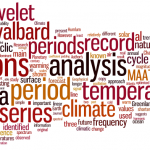Most people know that the Antarctic Peninsula is one of the most rapidly warming places on earth. But like everywhere else in Antarctica, the length of available temperature data is short — most records begin in 1957 (when stations were put in place during the International Geophysical Year); a few start in the late 1940s. This makes the recent rapid warming difficult to evaluate; in general, what’s interesting is how the trend compares with the underlying variability. As anyone who’s been there can tell you, the weather on the Antarctic Peninsula is pretty wild, and this applies to the climate as well: year to year variability is very large. Put another way, the noise level is high, and discerning the signal requires more data than is available from the instrumental temperature record. This is where ice cores come in handy — they provide a much longer record, and allow us to evaluate the recent changes in a more complete context.
A new paper in Nature this week presents results from an ice core drilled by the British Antarctic Survey (BAS) at James Ross Island on the Antarctic Peninsula. [Read more…] about Antarctic Peninsula warming: natural variability or “global warming”?


